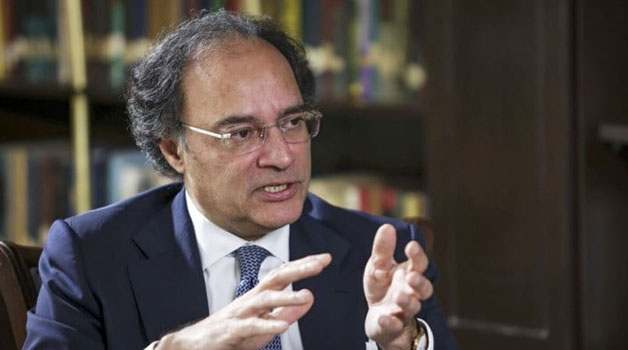Aurangzeb stresses tax reform, private sector growth at Pakistan Business Summit
Finance Minister Muhammad Aurangzeb laid out a broad economic roadmap centered on tax reforms, private sector empowerment, and strategic investment alignment. He shared these ideas during his keynote address at the Pakistan Business Summit being held in Peshawar today.
Highlighting the importance of domestic revenue generation, Aurangzeb said that “if the people pay taxes, there will be development.” He announced a major shift in fiscal policy, stating that next year’s national budget will be prepared by the newly established Tax Policy Office, while the Federal Board of Revenue (FBR) will focus exclusively on tax collection.
In a clear push for economic self-reliance, Finance Minister Aurangzeb also said that no foreign aid will be sought for flood recovery efforts, adding, “Efforts are being made to first fix the matters in the flood-affected areas on our own.” He commended the role of national institutions, noting that “every institution has taken a full part in the rehabilitation of flood victims.”
Turning to economic planning, the minister revealed that a development budget of Rs 4.3 trillion has been earmarked to stimulate growth across sectors. He also reiterated the government’s commitment to improving the privatisation process, asserting that “the privatization process is being improved at the government level.”
Aurangzeb called for policy harmony between local and international investors to create a more stable investment climate, and reiterated the centrality of the private sector in driving Pakistan’s future economic role globally. “What should be the role of Pakistan in the world economy? The private sector is very important in this,” he said, adding that tax reforms and private sector growth must go hand in hand.
He also flagged the significance of tapping into remittances, stating that Rs 38 billion in remittance flows must be formally incorporated into the economy.
Acting President Yousuf Raza Gilani, also addressing the summit, stressed the need for technological and educational progress to elevate Pakistan’s global standing. He called for a more conducive environment for investors, noting recent improvements in the GDP and textile industry, and highlighting mineral resources and tourism as key areas for expansion.
He advocated for greater inclusion of women in the economy, noting that they represent 60 per cent of the population. He said that security improvements are crucial for promoting tourism, particularly in regions like Khyber Pakhtunkhwa.
Khyber Pakhtunkhwa Governor Faisal Karim Kundi voiced concerns over the non-payment of the promised Rs 100 billion annual grant following the merger of FATA with the province. He called on the business community and banking sector to support regional growth and advocated for peace talks with Afghanistan to ensure long-term stability.




Comments are closed, but trackbacks and pingbacks are open.